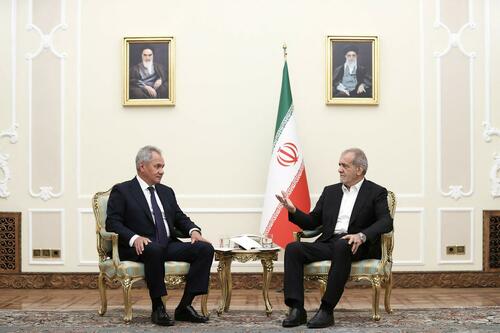Israeli security sources have told ABC News and CNN that Prime Minister Benjamin Netanyahu has approved a set of targets for retaliation strikes on Iran, considered imminent, following the Oct.1 major Iranian ballistic missile attack on Israel.
Still, no timeline has been given—only that the attack is expected to be carried out before November 5th, election day in America. "American officials expect Israel will retaliate against this month’s Iranian attack before November 5, sources tell CNN — a timeline that would thrust the growing volatility in the Middle East squarely into public view within days of the US presidential election," CNN has written. Russia and China are among the lone global voices urging against any new attack or escalation from Israel.

Beijing's concerns were conveyed in a call between the Chinese and Israeli foreign ministers early this week. The Chinese side also condemned attacks on the United Nations Interim Force in Lebanon (UNIFIL), following reports that the IDF wounded two of the UN peace keepers. China repeated its stance of wanting to see an immediate, complete and permanent cease-fire in Gaza.
But amid reports that Israel's expected attack on Iran could come at any moment, Russia has been the most forceful in its new warnings.
On Thursday Deputy Foreign Minister Sergey Ryabkov conveyed Russia's position that Israel must not even think about hitting Iran's nuclear energy sites or infrastructure.
He said that any "hypothetical" Israeli attack on Iran’s nuclear facilities would be "catastrophic" - as quoted in TASS.
"We have repeatedly warned and continue to warn, to caution [Israel] against even hypothetically considering the possibility of a strike on nuclear facilities and nuclear infrastructure [of Iran]," Ryabkov said. "This would be a catastrophic development and a complete negation of those postulates in the area of ensuring nuclear safety that exist."
Netanyahu has reportedly told the White House that Israel will commit to attacking only Iranian military sites; however, reports out of Israel continue to suggest that all options remain on the table.

Russia and Iran have of late deepened their relationship on the economic and military fronts. The West has even accused Tehran of transferring ballistic missiles to Russia for its war in Ukraine - something which Iranian and Russian officials have denied.
But the US and EU have still used the accusation to slap new sanctions on top Iranian and defense sector officials. Additionally the sanctions "target companies and individuals accused of being involved in the transfer of the weapons to Russia, including the country's flagship carrier Iran Air, as well as airlines Saha Airlines and Mahan Air."
Israeli security sources have told ABC News and CNN that Prime Minister Benjamin Netanyahu has approved a set of targets for retaliation strikes on Iran, considered imminent, following the Oct.1 major Iranian ballistic missile attack on Israel.
Still, no timeline has been given—only that the attack is expected to be carried out before November 5th, election day in America. "American officials expect Israel will retaliate against this month’s Iranian attack before November 5, sources tell CNN — a timeline that would thrust the growing volatility in the Middle East squarely into public view within days of the US presidential election," CNN has written. Russia and China are among the lone global voices urging against any new attack or escalation from Israel.

Beijing's concerns were conveyed in a call between the Chinese and Israeli foreign ministers early this week. The Chinese side also condemned attacks on the United Nations Interim Force in Lebanon (UNIFIL), following reports that the IDF wounded two of the UN peace keepers. China repeated its stance of wanting to see an immediate, complete and permanent cease-fire in Gaza.
But amid reports that Israel's expected attack on Iran could come at any moment, Russia has been the most forceful in its new warnings.
On Thursday Deputy Foreign Minister Sergey Ryabkov conveyed Russia's position that Israel must not even think about hitting Iran's nuclear energy sites or infrastructure.
He said that any "hypothetical" Israeli attack on Iran’s nuclear facilities would be "catastrophic" - as quoted in TASS.
"We have repeatedly warned and continue to warn, to caution [Israel] against even hypothetically considering the possibility of a strike on nuclear facilities and nuclear infrastructure [of Iran]," Ryabkov said. "This would be a catastrophic development and a complete negation of those postulates in the area of ensuring nuclear safety that exist."
Netanyahu has reportedly told the White House that Israel will commit to attacking only Iranian military sites; however, reports out of Israel continue to suggest that all options remain on the table.

Russia and Iran have of late deepened their relationship on the economic and military fronts. The West has even accused Tehran of transferring ballistic missiles to Russia for its war in Ukraine - something which Iranian and Russian officials have denied.
But the US and EU have still used the accusation to slap new sanctions on top Iranian and defense sector officials. Additionally the sanctions "target companies and individuals accused of being involved in the transfer of the weapons to Russia, including the country's flagship carrier Iran Air, as well as airlines Saha Airlines and Mahan Air."
